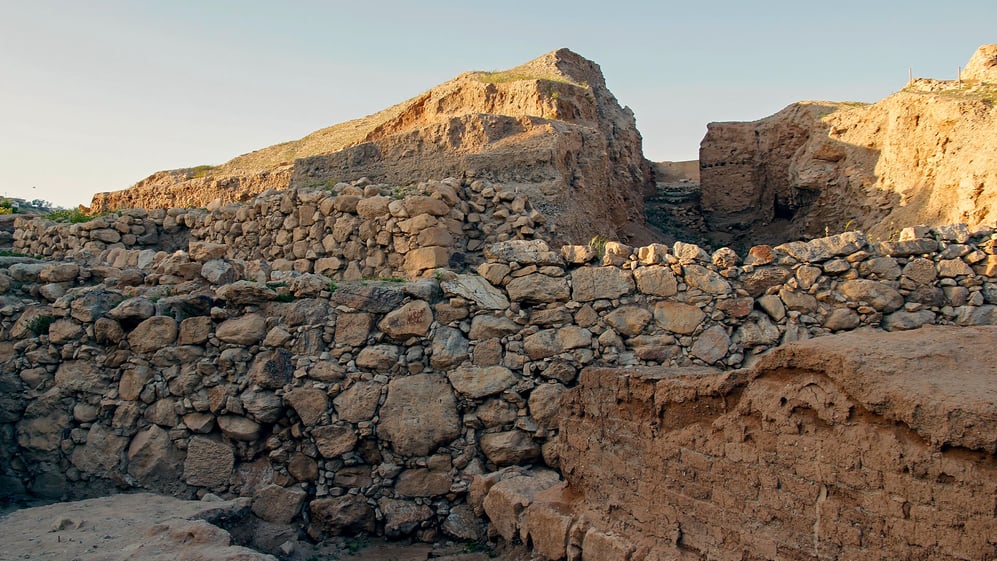After God had graciously formed Jacob’s descendants into His covenant people and named them as His own, He provided them a choice for the future: “If you will … then I will … ” Joshua presented this if/then choice to the people at Shechem in the renewal of the covenant. They could continue on the path God established for them, or they could follow the road to destruction by rejecting the covenant.
The Strength of Faith
Israel’s success and failure are in direct proportion to courage of faith and obedience. God put His power over all the earth at Israel’s disposal, but only as Israel tapped the resources of the Creator by trusting His promises and enacting the responsibilities of the Law could Israel overcome all odds. This axiom enables the reader to understand the Bible’s terse statements of what Israel achieved and what it failed to accomplish in taking possession of Canaan.
“By faith the people crossed the Red Sea as on dry land. … By faith the walls of Jericho fell down” (Heb 11:29–30). Walls crumbled and armies were routed when Israel armed itself with faith in God. Conversely, in the absence of the obedience of faith when and because Israel sinned and “transgressed My covenant” (Jsh 7:11), Israel suffered defeat. In the defeat at Ai, Israel’s natural resources and strength could have been sufficient to overwhelm the enemy (v. 3). God therefore made it clear that without faith resulting in obedience there would be no victory. Even after the death of Joshua, the strength or weakness of Israel always remained in strict proportion to the faithfulness of the tribes to the covenant. None of the tribes could occupy its allotted territory without divine aid.
God’s Almighty Strength
God’s miraculous help was needed because some of the odds or circumstances that the tribes faced were overwhelming by human standards. Judah, for example, was no match for the people of the plains and their chariots of iron (Jgs 1:19). But the true problem was lack of confidence in God’s help or the courage of faith to attempt the impossible. Iron chariots were nothing against the power of God in Joshua’s obedience to the covenant (Jsh 11:6, 9; cf Dt 20:1). Nor were they a problem later when “the LORD routed Sisera and all his chariots and all his army before Barak with the edge of the sword” (Jgs 4:15). If by faith the walls of Jericho fell, there was no fortress in Canaan that could have withstood the trumpet blasts of Israel’s faith.
All the while, God was channeling this miraculous help through circumstances that outwardly appeared to follow a natural pattern of cause and effect. A wind or landslide dammed up the Jordan (3:13–16; cf Ex 14:21), and hailstones helped defeat the army of the coalition of five kings headed by Jerusalem (Jsh 10:11). A naturalistic philosophy of history would say that these phenomena happened at an auspicious time, that Israel “got the breaks.” But the faithful are able to see God’s hand at work and sing,
He [God] turned the sea into dry land;
they passed through the river on foot.There did we rejoice in Him,
who rules by His might forever. (Ps 66:6–7)
The Law of Moses
The stories of the Old Testament have always served as sources for illustrating the meaning of the Ten Commandments and other portions of the Law of Moses, in keeping with the apostle Paul’s comment, “These things took place as examples for us, that we might not desire evil as they did” (1Co 10:6). The Book of Joshua notes that, in violation of the First Commandment, Israelites continued to cling to idols from Egypt even after years of wandering in the wilderness and settling in the Promised Land (24:14). The leaders of Israel feared a return to false worship (ch. 22). Oaths taken in God’s name (Second and Eighth Commandments) must not be broken (9:18); the example of Rahab and other biblical figures raised questions about whether it was wrong to lie (cf Zec 8:16–17). The Lord’s admonition for Joshua to meditate on the Law (1:7–8) shows its usefulness in preparing us for good works.
Blog post adapted from Lutheran Bible Companion, Volume 1: Introduction and Old Testament, copyright © 2014 Concordia Publishing House. All rights reserved.
Dig deeper into your study of the Old Testament and Joshua with historical documents, Lutheran insights, and more by ordering the Lutheran Bible Companion.






.jpg?width=50&height=50&name=IMG_20220621_160541_456%20(1).jpg)







